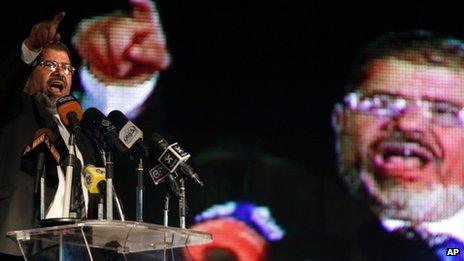Regional rise of the Muslim Brotherhood
- Published

Egypt's Muslim Brotherhood is the grandfather of Islamist groups in the Middle East. Since the organisation was set up in Ismailia in 1928, its influence has spread across the region and the Arab uprisings of 2011 have provided it with unprecedented political opportunities.
A Brotherhood candidate, Mohammed Mursi, will fight the run-off for the Egyptian presidential elections after taking the biggest share of votes in the first round of voting.
When I recently attended a rally for him in a poor neighbourhood on the edge of Cairo, there was a large, enthusiastic crowd chanting and waving posters. The electoral machine was in full operation.
Men and women sat separately in front of a large stage that had been erected on a plot of wasteland between high-rise apartment buildings. For one night, volunteers had transformed the area, placing carpets on the ground and stringing up lanterns to add a kind of festive feel.
"Dr Mohammed Mursi is the most powerful man in these elections," a Brotherhood member, Mustafa, told me, confident of a win. "At last we'll have a very good president who will bring freedom and justice for all Egyptians."
"We want to try the Islamic ideas," said Hana Hassan. "We think that Dr Mohammed is the man for this time."
Another woman, Widad, pointed to the organisational strength of the Brotherhood as a reason to support its campaign.
"What will make me elect Dr Mursi is not Dr Mursi as a person, but it's their project as a group," she said.
Islamists already dominate the new parliament in Egypt. The Brotherhood's political arm, the Freedom and Justice Party [FJP], controls the largest bloc.
'Renaissance'
The organisation, which was banned for six decades, is currently undergoing a renaissance - the very word it has chosen as the title for its wide-ranging political plan for Egypt.
In other Arab countries where there have been uprisings, related groups are also on the rise.
In Libya, where a national assembly election is expected on 19 June, the Muslim Brotherhood has become a main political player. In Syria, it remains an important opposition force.
The movement has also inspired Tunisia's main Islamist party, Ennahda (Renaissance), which leads a governing coalition.
"I believe this is a very important historical moment. For the first time, the Islamic movements have the right to participate in politics," says Fatima Abuzeid, who works in the FJP's Foreign Relations Unit.
Crossing borders
Recently, Egypt's Brotherhood, long held back by travel bans, has sent delegations of its leading members across the world.
However it has put a special focus on its neighbours where political change is also under way.
"Egypt is becoming a very important actor, other countries with revolutions are becoming very important," says Mrs Abuzeid.
"We are trying to come close to each other, to work as partners. We are trying also to have a kind of coordination on our foreign relations, to build a kind of effective foreign relations for the Arab countries."
It is this new development that is producing a dramatic shift in the region.
As a strong Sunni Muslim bloc emerges in North Africa, it is already starting to undermine the regional influence of Iran, a big Shia Muslim power.
Until recently, Tehran's support for Syria and other proxies - the militant group, Hezbollah in Lebanon and Hamas in Gaza - gave it regional leverage.
Now Shadi Hamid, research director at the Brookings Doha Centre, believes it is much weaker.
"What we used to call the resistance axis made up of Syria - Hamas and Hezbollah - that's been destroyed. Iran is not on the right side of these regional changes," he says.
"There's a kind of tendency in the West to make Iran into some kind of regional superpower. But I think now at least when you measure it by soft power, that's not the case at all."
Hamas office
In Egypt, there is more evidence of how the Arab spring's upheaval is having an effect on the Palestinian Islamist group, Hamas.
I travelled to a well-off New Cairo neighbourhood to meet Musa Abu Marzouk, who recently moved here when his group's political bureau was forced out of Syria, where it was living in exile.
Hamas, which governs Gaza, is an ideological offshoot of the Muslim Brotherhood. Mr Abu Marzouk told me it hopes to benefit from regional changes.
"When you see the same ideology, the same Islamists in all North Africa, I guess it's going to be good for Hamas," he said.
"We have a very deep relationship with all of those people who came to the governments and that means we expect them to support Hamas and the Palestinian cause more than the previous governments."
In future, Mr Abu Marzouk says that Hamas might seek to open a new office in Cairo.
The rising Islamist trend could have far-reaching implications for transforming regional relationships.